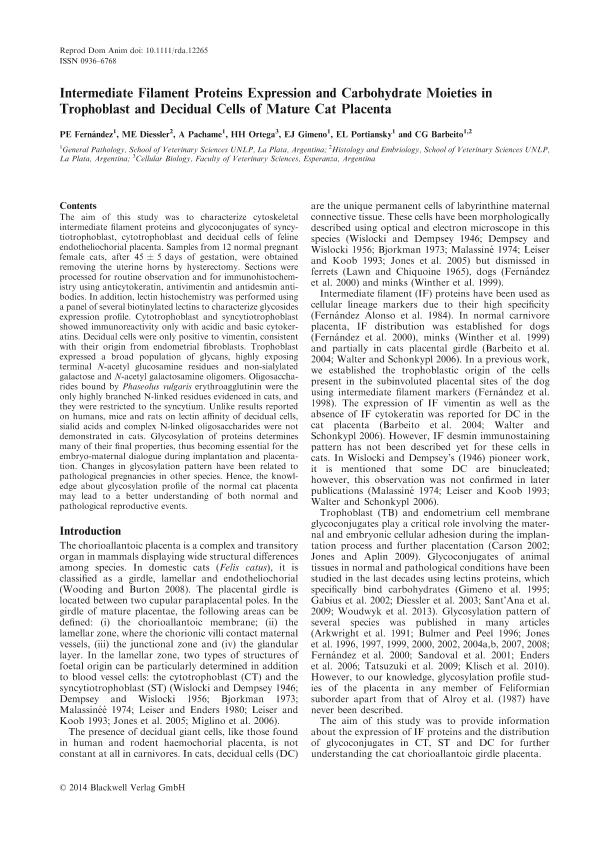Mostrar el registro sencillo del ítem
dc.contributor.author
Fernández, Patricia Elena

dc.contributor.author
Diessler, Mónica Elizabeth

dc.contributor.author
Pachamé, Andrea Viviana

dc.contributor.author
Ortega, Hugo Hector

dc.contributor.author
Gimeno, Eduardo Juan

dc.contributor.author
Portiansky, Enrique Leo

dc.contributor.author
Barbeito, Claudio Gustavo

dc.date.available
2017-07-12T20:55:09Z
dc.date.issued
2014-04
dc.identifier.citation
Fernández, Patricia Elena; Diessler, Mónica Elizabeth; Pachamé, Andrea Viviana; Ortega, Hugo Hector; Gimeno, Eduardo Juan; et al.; Intermediate filament proteins expression and carbohydrate moieties in trophoblast and decidual cells of mature cat placenta; Wiley; Reproduction in Domestic Animals; 49; 2; 4-2014; 263-269
dc.identifier.issn
0936-6768
dc.identifier.uri
http://hdl.handle.net/11336/20290
dc.description.abstract
The aim of this study was to characterize cytoskeletal intermediate filament proteins and glycoconjugates of syncytiotrophoblast, cytotrophoblast and decidual cells of feline endotheliochorial placenta. Samples from 12 normal pregnant female cats, after 45 ± 5 days of gestation, were obtained removing the uterine horns by hysterectomy. Sections were processed for routine observation and for immunohistochemistry using anticytokeratin, antivimentin and antidesmin antibodies. In addition, lectin histochemistry was performed using a panel of several biotinylated lectins to characterize glycosides expression profile. Cytotrophoblast and syncytiotrophoblast showed immunoreactivity only with acidic and basic cytokeratins. Decidual cells were only positive to vimentin, consistent with their origin from endometrial fibroblasts. Trophoblast expressed a broad population of glycans, highly exposing terminal N-acetyl glucosamine residues and non-sialylated galactose and N-acetyl galactosamine oligomers. Oligosaccharides bound by Phaseolus vulgaris erythroagglutinin were the only highly branched N-linked residues evidenced in cats, and they were restricted to the syncytium. Unlike results reported on humans, mice and rats on lectin affinity of decidual cells, sialid acids and complex N-linked oligosaccharides were not demonstrated in cats. Glycosylation of proteins determines many of their final properties, thus becoming essential for the embryo-maternal dialogue during implantation and placentation. Changes in glycosylation pattern have been related to pathological pregnancies in other species. Hence, the knowledge about glycosylation profile of the normal cat placenta may lead to a better understanding of both normal and pathological reproductive events.
dc.format
application/pdf
dc.language.iso
eng
dc.publisher
Wiley

dc.rights
info:eu-repo/semantics/openAccess
dc.rights.uri
https://creativecommons.org/licenses/by-nc-sa/2.5/ar/
dc.subject
Feline
dc.subject
Endotheliochorial Placentation
dc.subject
Cytotrophoblast Cells
dc.subject
Syncytiotrophoblast
dc.subject
Decidualization
dc.subject
Glycoconjugates
dc.subject
Cytokeratins
dc.subject
Vimentin
dc.subject
Desmin
dc.subject.classification
Biología Reproductiva

dc.subject.classification
Ciencias Biológicas

dc.subject.classification
CIENCIAS NATURALES Y EXACTAS

dc.subject.classification
Otras Ciencias Veterinarias

dc.subject.classification
Ciencias Veterinarias

dc.subject.classification
CIENCIAS AGRÍCOLAS

dc.title
Intermediate filament proteins expression and carbohydrate moieties in trophoblast and decidual cells of mature cat placenta
dc.type
info:eu-repo/semantics/article
dc.type
info:ar-repo/semantics/artículo
dc.type
info:eu-repo/semantics/publishedVersion
dc.date.updated
2017-07-07T20:07:31Z
dc.journal.volume
49
dc.journal.number
2
dc.journal.pagination
263-269
dc.journal.pais
Reino Unido

dc.journal.ciudad
Londres
dc.description.fil
Fil: Fernández, Patricia Elena. Universidad Nacional de la Plata. Facultad de Ciencias Veterinarias. Cátedra de Patología General Veterinaria; Argentina
dc.description.fil
Fil: Diessler, Mónica Elizabeth. Universidad Nacional de La Plata. Facultad de Ciencias Veterinarias. Departamento de Ciencias Básicas. Cátedra de Histología y Embriología; Argentina. Consejo Nacional de Investigaciones Científicas y Técnicas; Argentina
dc.description.fil
Fil: Pachamé, Andrea Viviana. Universidad Nacional de la Plata. Facultad de Ciencias Veterinarias. Catedra de Patologia Especial; Argentina
dc.description.fil
Fil: Ortega, Hugo Hector. Consejo Nacional de Investigaciones Científicas y Técnicas. Centro Científico Tecnológico Conicet - Santa Fe. Instituto de Ciencias Veterinarias del Litoral. Universidad Nacional del Litoral. Facultad de Cs.veterinarias. Instituto de Ciencias Veterinarias del Litoral; Argentina
dc.description.fil
Fil: Gimeno, Eduardo Juan. Consejo Nacional de Investigaciones Científicas y Técnicas; Argentina. Universidad Nacional de la Plata. Facultad de Ciencias Veterinarias. Catedra de Patologia Especial; Argentina
dc.description.fil
Fil: Portiansky, Enrique Leo. Universidad Nacional de la Plata. Facultad de Ciencias Veterinarias. Cátedra de Patología General Veterinaria; Argentina. Consejo Nacional de Investigaciones Científicas y Técnicas; Argentina
dc.description.fil
Fil: Barbeito, Claudio Gustavo. Consejo Nacional de Investigaciones Científicas y Técnicas; Argentina. Universidad Nacional de la Plata. Facultad de Cs.veterinarias. Departamento de Patologia; Argentina
dc.journal.title
Reproduction in Domestic Animals

dc.relation.alternativeid
info:eu-repo/semantics/altIdentifier/doi/http://dx.doi.org/10.1111/rda.12265
dc.relation.alternativeid
info:eu-repo/semantics/altIdentifier/url/http://onlinelibrary.wiley.com/doi/10.1111/rda.12265/abstract
Archivos asociados
